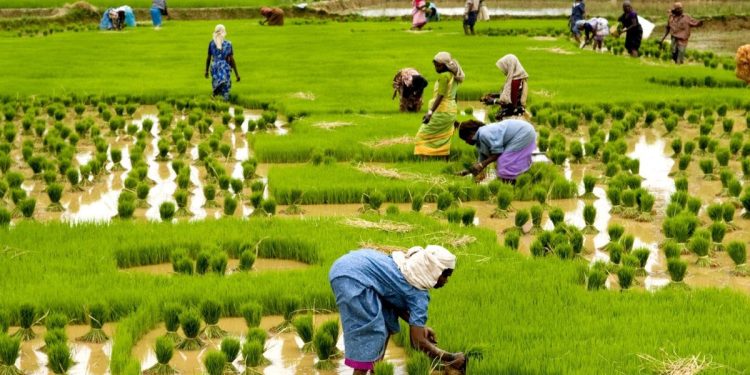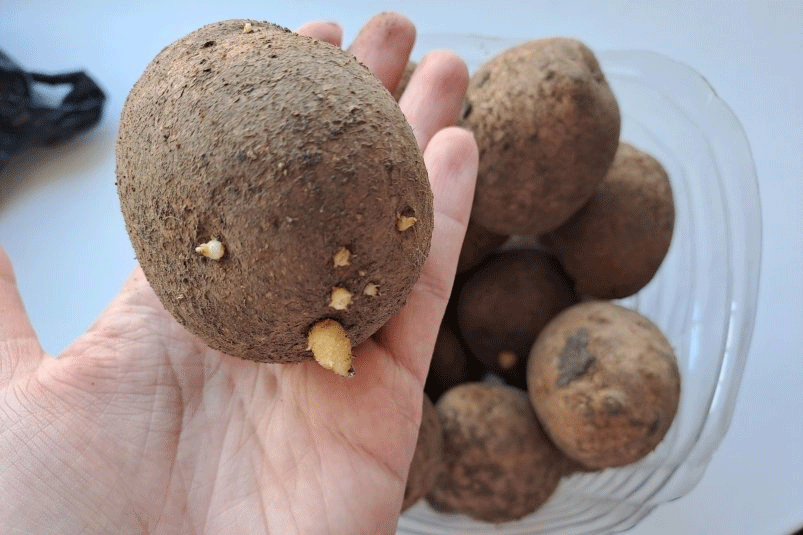irst and foremost challenge before the institute is to enable the country to achieve potato production of 125 million t at an ACGR of 3.2% with the help of 34.51 t/ha productivity and 3.62 million ha area under the crop during 2050. Availability of additional agricultural area, fragmentation of land holdings, abiotic and biotic stresses are expected to pose serious constraints for the future growth of potato in India. Modelling research shows that problem of bacterial wilt, late blight, PTM and white flies will aggravate under the regime of climate change. Development of short duration and biotic stress resistant potato varieties will be employed to mitigate these constraints. The challenges in the way of achieving these targets and technological interventions in order to meet these challenges need to be addressed separately for different time horizons.
Short Term
Rising input prices and severe shortage of farm labour are posing very serious short term challenges for potato cultivation in India. Steady increment in the prices of potato’s competing crops over last several years, such as wheat, sugarcane and other vegetables; have gradually lowered comparative profitability of this crop. Further, the input prices have been increasing steadily while the output prices are relatively stable affecting farm profitability adversely. Enhanced resistance of pests (both diseases and pests) to the chemicals in the past is another important issue to be addressed in the short run. Rising average night temperature and fog in several potato growing areas in the country is lowering already constrained productivity of potato due to limited sunshine hours and shorter crop duration. Lack of state of the art transport infrastructure adversely affects potato producers and consumers across the country due to its bulky nature and seasonal as well as regional concentration of production scenario. This deprivation is not only responsible for wider price differences in this agri-commodity across the regions but also high post-harvest losses. Shortage of cold storage capacity and also their functionality in some parts of the country has also negatively affected potato growth.
Comparative farm profitability studies will be conducted to explain these issues to policy makers. Enhancement of crop productivity through more intensive and concerted efforts on dissemination of potato technologies to the end users will be used as a strategy to bridge yield gaps and to augment potato profitability of farmers. Improvement of seed potato quality will be achieved through state of the art diagnostics using transmission electron microscope, molecular techniques and dipstick. Subsequently rapid in-vitro multiplication of planting material will be done using areoponics and other biotechnological techniques. Development of suitable potato machines for small and marginal farmers will be very high on the agenda of the institute. More than half of farm labour on mechanised farms is currently used for picking potato tubers. For large farmers, the institute will expedite the work of developing combine potato harvester performing digging and tubers lifting activities. Application of molecular techniques for better diagnostics and understanding the genetic makeup of potato pests in the recent past is likely to bring desirable results in the short term. After successful release of heat tolerant potato variety, Kufri Surya, CPRI is likely to release more such varieties to tackle the problem of heat stress in the short term. Gene(s) responsible for tuberisation will be identified in order to facilitate development of early maturity of potato.
Medium Term
Climate change, erratic precipitation and shortage of irrigation water would be important medium term challenges for potato cultivation in India. Creating supportive conditions for taking potato processing levels from the current 2.8 million tonne (including the processing at household, cottage industry and unorganised sector) to 6 million tonne (near 10% of anticipated potato production in the country) in the medium term is another challenge for the institute. Food security is likely to gain much higher importance in India in the medium term and potato will have to shoulder much heavier responsibility to address this impending challenge. As the future potato growth has to be led by productivity enhancement, increase in production potential and bridging yield gaps in spite of the impact of climate change on potato productivity per se and also due to its effect of higher biotic stresses.
Research efforts on development of micro-irrigation technologies for potato and their better dissemination in the regions with scarcity of irrigation water will be undertaken at CPRI. Development of improved processing varieties of potatoes under the ongoing breeding programme at the institute will help the nation raise potato processing levels. Enhancement of potato production potential in various parts of the country in light of heat and moisture stresses under climate
Precision farming
Precision farming as a tool of yield enhancement is ecologically better option and the institute will pay increased attention to such of technologies that offers enhanced resource use efficiency. The efficiency of production resources is enhanced by providing precise quantities of the inputs to the crops in right compositions. In the initial phase the institute will focus on precise application of inputs based on weather, soil and crop requirements to maximize productivity, quality and profitability in a more sustainable way.
change regime and national food security will be addressed through the exploitation of biotechnological and molecular breeding and plant protection techniques. In order to achieve higher harvest index from crop plant dwarf potato genotypes will also be developed using molecular techniques for cultivation under long photoperiod and or high temperature. Raising potato production efficiency will be achieved with the help of modelling research, precision farming, nanotechnology and improved mechanisation. Augmentation of seed potato quality and dissemination of technical knowhow to various stakeholders will be targeted through appropriate means in order to raise the crop productivity.
Long Term
Most of the medium term challenges are expected to extend in long term too. In fact some of the challenges like climate change and its adverse impacts are expected to aggravate further. Over next 40 years 465 million people will be added to our existing 375 million urban population (NCAP estimates) which will generate a huge demand for processed potato products. The industry has to be supported by the required technologies including the need for improved processing varieties in order to enhance potato processing up to 25 million t by the year 2050. Food security of 1619 million people will really be a tough challenge after 40 years. Increasing production potential of potato under the era of enhanced biotic and abiotic stresses to potato crop under global warming and climate change scenario is another complicated challenge before us in the long term. Dissemination of refined potato technologies to a very large number of small and marginal farmers in India is a challenge of its own type in India.
Efficient input (fertilizers, pesticides and irrigation etc.) delivery system and more accurate diagnosis of diseases using nano-science widely across the country will be one of the solutions for tackling the challenges of food security and enhancement of production potential in next 40 years. CPRI has already initiated concerted efforts in this direction. Use of biotechnological and molecular techniques to develop potato varieties with higher yield potential and resistance to diseases and pests will be another solution for this problem. Identifying yield enhancing traits through modelling research, manipulating crop geometry and developing ideotypes will also be employed. Development of drought and heat tolerant potato varieties will play crucial role in the future of Indian potato industry. Precision farming and improved mechanisation (e.g. automatic potato harvester, grader and bag filler) will be used to enhance potato farm profitability. Advanced information technology based dissemination (e.g. on mobile phones and through decision support/expert systems) of refined scientific potato technologies will be utilized.





